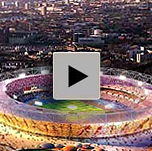

International Cricket Council (ICC)
The International Cricket Council (ICC) is the international governing body of cricket. It was founded as the Imperial Cricket Conference in 1909 by representatives from England, Australia and South Africa, renamed the International Cricket Conference in 1965, and took up its current name in 1989.The ICC has 97 members: 10 Full Members that play official Test matches, 32 Associate Members, and 55 Affiliate Members. The ICC is responsible for appointing the umpires and referees that officiate at all sanctioned Test matches and One-day Internationals. The ICC derives most of its revenue from the rights to the Cricket World Cup. It promulgates the ICC Code of Conduct, which sets professional standards of discipline for international crickets, and also co-ordinates action against corruption and match-fixing through its Anti-Corruption and Security Unit (ACSU).
The current President is Percy Sonn of South Africa who replaced Ehsan Mani on 7 July 2006. The current CEO is Malcolm Speed
ICC History
On June 15, 1909 representatives from England, Australia and South Africa met at Lord's and founded the Imperial Cricket Conference. Membership was confined to the governing bodies of cricket within the British Empire where Test cricket was played. India, New Zealand and West Indies were elected as Full Members in 1926, doubling the number of Test-playing nations to six. After the formation of Pakistan in 1947, it was given Test status in 1953, becoming the seventh Test-playing nation. South Africa resigned from the ICC in 1961 due to apartheid.In 1965, the Imperial Cricket Conference was renamed the International Cricket Conference and new rules adopted to permit the election of countries from outside the Commonwealth. This led to the expansion of the Conference, with the admission of Associate Members. Associates were each entitled to one vote, while the Foundation and Full Members were entitled to two votes on ICC resolutions. Foundation Members retained a right of veto.
Sri Lanka was admitted as a Full Member in 1981, returning the number of Test-playing nations to seven. In 1989, new rules were adopted and International Cricket Conference changed its name to the current name, the International Cricket Council. South Africa was re-elected as a Full Member of the ICC in 1991, after the end of apartheid; this was followed in 1992 by the admission of Zimbabwe as the ninth Test-playing nation. Bangladesh was admitted as the tenth Test-playing nation in 2000.
ICC Rules and regulation
The International Cricket Council overlooks playing conditions, bowling reviews, and other ICC regulations. Even though the ICC doesn't have copyright to the laws of cricket and only the MCC may change the laws, nowadays this would usually only be done after discussions with the game's global governing body, the ICC. The ICC also has a "Code of Conduct" to which teams and players in international matches are required to adhere. Where breaches of this code occur the ICC can apply sanctions, usually fines. In 2006 the ICC imposed 27 penalties on players.ICC Members
The ICC has three classes of membership: Full Members, the ten governing bodies of teams that play official Test matches; Associate Members, the 33 governing bodies in countries where cricket is firmly established and organised but which do not qualify for Full Membership; and Affiliate Members, the 58 governing bodies in countries where the ICC recognises that cricket is played according to the Laws of Cricket.Location
From its formation the ICC had Lord's Cricket Ground as its home with offices in the "clock tower" building at the nursery end of the ground. However as the commercial element of the Council's operations became prominent the ICC sought ways to avoid tax liability on commercial income. This led, in 2001, to the establishment of an office in Monaco to which all of the commercial staff relocated. This move successfully removed the Council's tax liability however there was a disadvantage in that the Council's cricket administrators, who remained at Lord's, were separated from their commercial colleagues who had moved to Monaco. The council decided to seek ways of bringing all of their staff together in one office whilst protecting their commercial income from tax.The option of staying at Lord's was investigated and a request was made, through Sport England, to the British Government to allow the ICC to have all its personnel (including those working on commercial matters) in London - but be given special exemption from paying UK corporation tax on its commercial income. The British Government was unwilling to create a precedent and would not agree to this request. As a consequence the ICC examined other locations and eventually settled on the emirate of Dubai in the United Arab Emirates. In August 2005 the ICC moved its offices to Dubai, and subsequently closed its offices at Lord's and Monaco. The move to Dubai was made after an 11-1 vote by the ICC's Executive Board in favour.
Whilst the principal driver of the ICC's move to Dubai was the wish to bring its main employees together in one tax efficient location, a secondary reason was the wish to move offices closer to the increasingly important new centres of cricketing power in South Asia. Lord's had been a logical venue when the ICC had been administered by the MCC (a situation that lasted until 1993). But the growing power of India, Pakistan and to a lesser extent Sri Lanka, in world cricket had made the continued control of international cricket by a British private members club (the MCC) anachronistic and unsustainable. A direct consequence of the changes and reforms instituted in 1993 was eventually to be the move away from Lord's to a more neutral venue.



